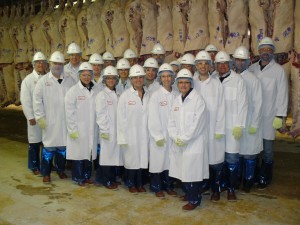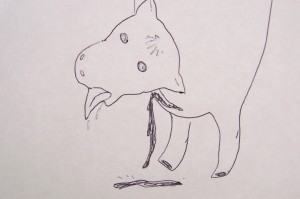***WARNING*** This post contains explicit descriptions and disturbing images.
Today as part of my Leadership Weld County class, we focused on economic development in the Weld County area. The largest employer and main reason for Greeley’s existence? JBS/Swift formerly known as ConAgra meats, formerly Monfort.
JBS is huge. They employ about 2000 people (mainly blue-collar unskilled labor). The Monfort family was one of the first to start the process of confined feeding operations (feedlots) and expanded into the slaughter. In the factory model, they made the raw product and then the finished one.
The Monfort family still lives in Greeley and are very influential. There is a Monfort School of Business at the University of Northern Colorado, a Monfort Family Clinic, birthing center, school, children’s clinic and many other areas with their name affixed. A local steakhouse is named after one of the early Monforts (Kenny’s). It was only fitting for us to visit JBS to see the economic and other impact on our community.
Our tour guide just happened to be an old family friend who has worked at Monfort/ConAgra/Swift/JBS for about 30 years! It was nice seeing him again and brought up all sorts of memories of my parents hanging out with them, playing softball and spending time together. It’s amazing he has worked there that long! I do not think I could last one day there. But it does show how the people in my community -my friends! rely on this to make a living (or is it a killing?!)
We went from “clean to dirty” as he put it, or the opposite of production. First we had to get all geared up with steel-toed boots, gators, hair nets (and beard nets for the boys), goggles, helmets, ear plugs, gloves and lab coats. Then we saw the packaging of the T-Bones, hamburger, ribeyes, trimming and all the other cuts. There were hundreds of people just hacking into the parts and sawing them in half and other not-so-fun jobs. Next we went to the carcass area where they were all cold and sliced directly in half vertically. I didn’t bring my camera in, but we did get one “group photo” in front of thousands of carcasses. Generally you take photos in front of something beautiful or visually stunning. This was stunning all right, but in a morbidly strange way. What do you think?

Can you find me? (Hint: I am short) Can you count how many dead cows? (Hint: They are more cows than people in this pic)
Next we went to the “Hot” area. It was very hot and pretty stinky. Every time we passed a doorway there was this sudsy soapy stuff we walked through -I am guessing to decrease tracking in stuff. This was the area immediately after the kill floor. We had to run between the huge swinging carcasses. Luckily, I didn’t actually see a kill because I don’t think I could have stood to see one after another after another. They said they go through about 5,000 to 6,000 cows every DAY! Holy cow! That’s about 2,000,0000 (Two Million!) cows every year! Each 5,000 cows make about 30,000 boxes of 60 lbs of beef. We also learned that their primary customers are McDonald’s, Burger King, Carl’s Jr and other fast food places, Sam’s, Costco and all the major big box grocery stores.
We did learn about how they killed them and saw the immediate after effects. First they use a knocker (like in the movie No Country for Old Men) to render them unconscious but not dead. They need the heart to continue pumping to get all the blood out, which is accomplished by slicing their neck. I watched cow after cow bleed out right in front of me. This, is the mental picture I cannot erase from my head. They tie up the cows by their back legs so the blood can drain out. Their tongues are wagging out and their eyes are open and scary looking. This is my mental image that I made into a drawing:
I have to say that while it wasn’t pleasant (at all) I am still glad I went through and saw this. This is the backbone of our community (for better or for worse). I also know why I don’t eat much meat -especially red meat. We didn’t get a chance to see all the feedlots, but Britton and I have flown over them in a small private plane and they go on for miles and miles. Nothing but cows standing in “manure” to put it nicely. Not munching on grass or resting on pasture. Standing knee deep in crap two feet from the next cow that just crapped all over the other one.
And it’s not that I don’t eat meat at all. I am not a vegetarian, but I do try to limit the amount I eat, in order to lessen the demand for such entities like this. I try to support small-scale enterprises and eat pastured meat (and eggs, obviously). I understand economies of scale, but why do we humans try to make factories out of everything? Even living beings like these cows we measure by how many we can cram into a cardboard box.
Plus feedlots emit more greenhouse gases than cars, they introduce antibiotics into our bodies (because they have to give them to the cows or they would be too sick) creating a perfect petri dish for super-bugs, and are given hormones (to fatten them up faster than is normal) that ultimately affect our hormones. And while E. Coli is a naturally occurring bacteria, all the antibiotics and exposure to other sick cows from eating grain-based diets instead of grass creates super-E.Coli in huge amounts which are much more dangerous to people than the regular variety. These huge factories also condense all the waste and pollution into one place and make our backyard literally stink. It’s way worse than our 4 chickens every could possibly stink. Which makes me laugh that we would think a few backyard chickens are the bane of Greeley instead of the huge elephant -er- cow in the room.
So overall, I’d say I feel like this was something I had to see in order to be better educated personally, but now I am further committed to a limited-meat diet and want to give more support for those few independent and sustainable small-scale farmers and ranchers out there trying to compete with these huge factories. And another reminder -go see Food, Inc! It’s a primer on all this stuff, if this is news to you.

